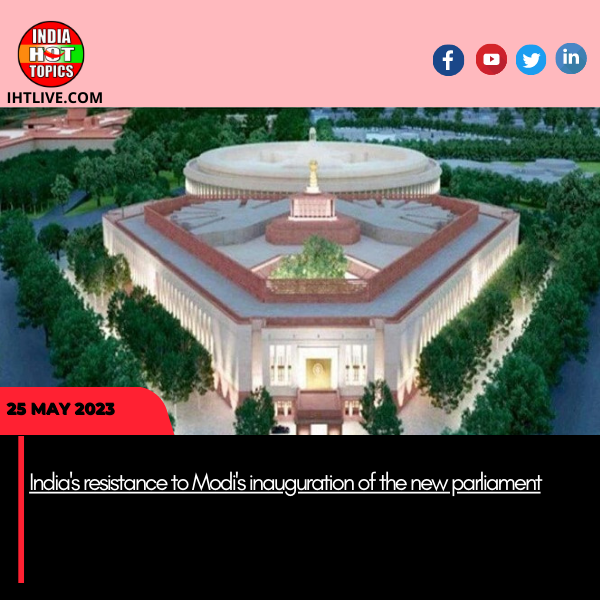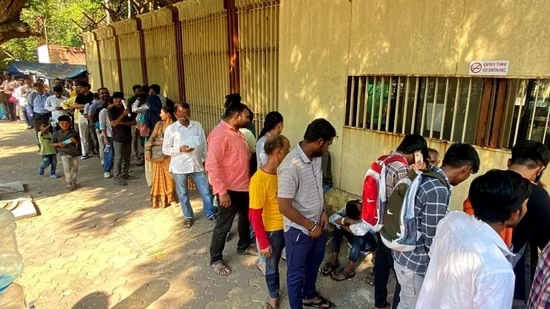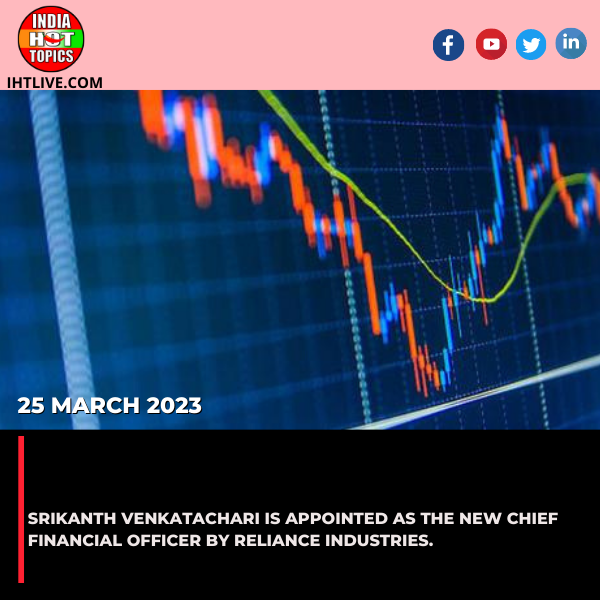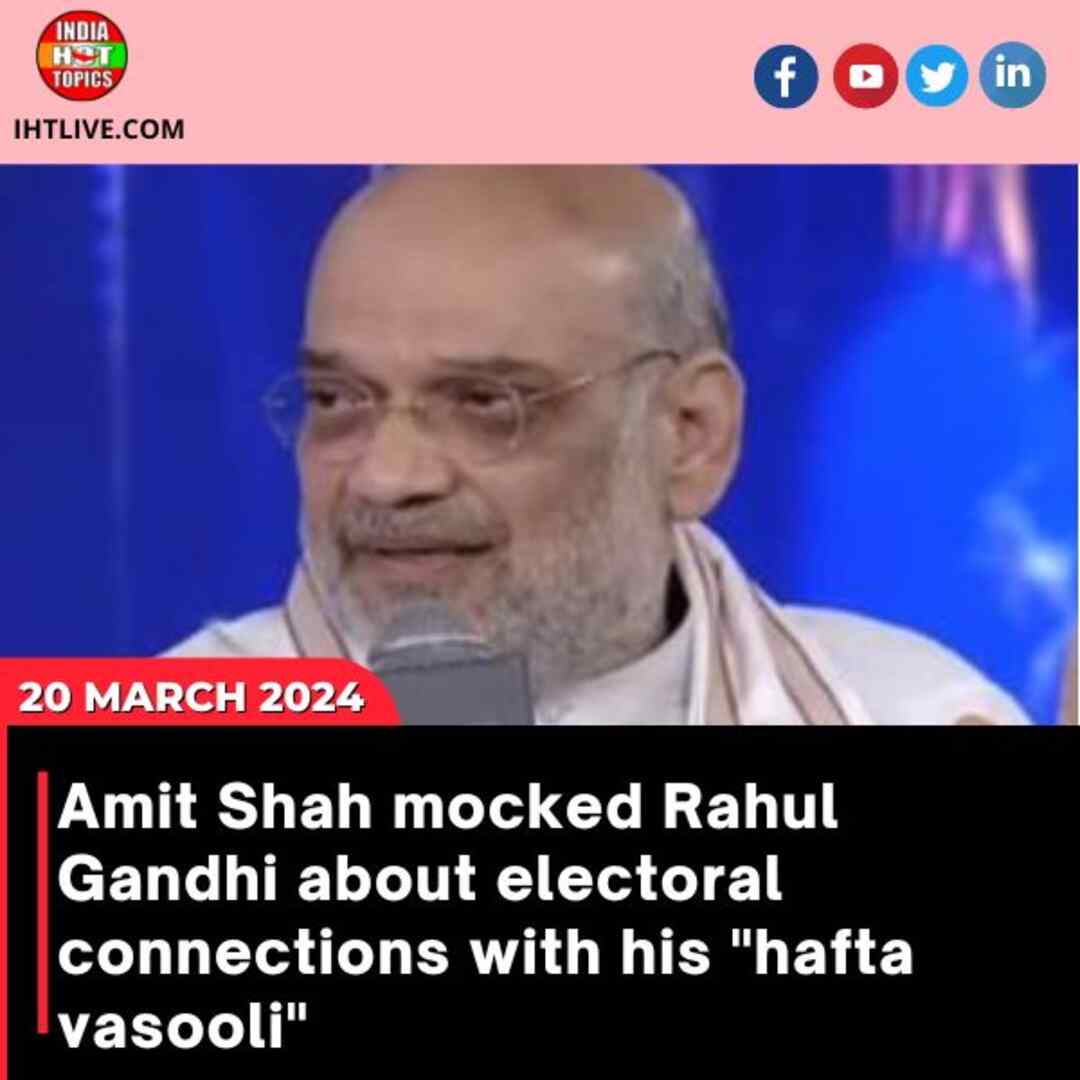India
India’s resistance to Modi’s inauguration of the new parliament

India, the world’s largest democracy, has long been a nation known for its vibrant political landscape and passionate citizenry. However, in recent years, the country has witnessed a rising tide of resistance to the government led by Prime Minister Narendra Modi. The inauguration of the new parliament under Modi’s leadership has become a focal point for dissent, as many voices within the nation express concerns over the erosion of democratic values and the concentration of power. In this blog, we delve into the reasons behind India’s resistance to Modi’s inauguration of the new parliament and explore the implications for the nation’s democratic fabric.
- Concentration of Power:
One of the key concerns voiced by those resisting Modi’s inauguration is the perceived concentration of power within the government. Critics argue that under the Modi administration, decision-making authority has become increasingly centralized, leading to a weakening of democratic institutions and processes. The dominance of a single party in the political landscape, coupled with the prime minister’s strong leadership style, has raised questions about the checks and balances necessary for a healthy democracy.
- Suppression of Dissent:
India’s resistance to Modi’s inauguration also stems from a perceived suppression of dissent. The government has faced criticism for its handling of civil liberties, including curbing freedom of speech, press freedom, and stifling of dissenting voices. The arrest of activists, journalists, and intellectuals has been met with widespread condemnation both within India and internationally. Many argue that these actions undermine the democratic principles of open dialogue, transparency, and the right to express dissenting opinions.
- Polarization and Divisive Politics:
Another factor contributing to India’s resistance to Modi’s inauguration is the increasing polarization and divisive politics witnessed in recent years. Critics argue that the government’s rhetoric and policies have exacerbated communal tensions and deepened societal divisions. The rise of identity politics, coupled with incidents of hate crimes and discrimination, has created an atmosphere of fear and exclusion. The resistance movement perceives these developments as detrimental to India’s pluralistic ethos and democratic ideals.
- Socioeconomic Concerns:
The resistance to Modi’s inauguration also reflects the frustration and discontent arising from socioeconomic issues. While the government has introduced various reform initiatives, including the Goods and Services Tax (GST) and demonetization, critics argue that the implementation has had adverse effects on vulnerable sections of society. Issues such as unemployment, agrarian distress, rising income inequality, and the impact of economic policies on marginalized communities have fueled dissent and mobilized opposition.
- Threats to Secularism:
Secularism has been a foundational principle of modern India, enshrined in its constitution. However, the resistance movement views the Modi government’s policies as threatening this core value. Critics argue that certain actions and policies, such as the controversial Citizenship Amendment Act (CAA) and the National Register of Citizens (NRC), disproportionately target religious minorities, particularly Muslims. This perceived marginalization of specific communities has led to widespread protests and resistance, with concerns raised about the erosion of India’s secular fabric.
India’s resistance to Modi’s inauguration of the new parliament underscores the complex challenges facing the nation’s democracy. Critics argue that the concentration of power, suppression of dissent, divisive politics, socioeconomic concerns, and threats to secularism have collectively weakened democratic institutions and processes. However, it is important to note that the resistance movement represents a diverse range of voices with varied ideologies and objectives. As India navigates this crucial phase, it is imperative that the government and citizens engage in constructive dialogue, uphold democratic values, and work towards a more inclusive and equitable future for all. The strength of India’s democracy lies in its ability to embrace differing viewpoints and ensure that dissent is not only protected but also valued as an essential component of a robust democratic system.
General News Platform – https://ihtlive.com/
Entertainment News Platforms – anyflix.in
Construction Infrastructure and Mining News Platform – https://cimreviews.com/
Podcast Platforms – https://anyfm.in/
India
Congress leader: “Kangana Ranaut once said she likes beef.” BJP retaliates
A significant controversy ensued following Congress leader Supriya Shrinate’s controversial social media post about actor-turned-politician Kangana Ranaut.
The Bharatiya Janata Party (BJP) has criticized Maharashtra Opposition and Congress leader Vijay Wadettiwar for claiming actor Kangana Ranaut’s post on Twitter about her beef preferences and the BJP’s decision to grant her a Lok Sabha election ticket.
Shaina NC, a BJP leader in Maharashtra, criticised Congress leader Vijay Wadettiwar’s comments and other ludicrous remarks made by Congress leaders. She stated that Wadettiwar’s actions, including granting Kangana Ranaut a ticket due to her beef consumption, are not the first time Congress has made such ludicrous remarks.
Shaina criticizes Congress social media in-charge Supriya Shrinate’s post against Ranaut, claiming that Shrinate’s comments and Randeep Surjewala’s discussion about Hema Malini’s attributes are anti-women, despite her age.
Shaina pledged that all women would participate in the voting process, and the results on June 4 would provide a “fitting answer to Congress.”
The Prime Minister of India has ensured respect for women in various political parties, including Triple Talaq and Nari Shakti Vandan. If the Congress party lacks thought processes, the answer will be on June 4 when Indian women vote against the anti-woman Congress party.
Supriya Shrinate’s post that sparked controversy
Congress leader Supriya Shrinate’s controversial social media post about actor-turned-politician Kangana Ranaut, who received a BJP ticket from the Mandi constituency in Himachal Pradesh for the upcoming Lok Sabha election, sparked a massive controversy.
Kangana, in response to Shrinate’s post, emphasized that every woman deserves respect and dignity. She shared her 20-year career as an artist, which includes portraying various women, from naive girls in Queen to seductive spy in Dhaakad, goddesses in Manikarnika, demons in Chandramukhi, prostitutes in Rajjo, and revolutionary leaders in Thalaivii.
The Congress leader later revealed that someone with access to her social media accounts had posted objectionable content.
General News Platform – https://ihtlive.com/
Entertainment News Platforms – anyflix.in
Construction Infrastructure and Mining News Platform – https://cimreviews.com/
Podcast Platforms – https://anyfm.in/
India
PM Modi mocks Congress’s Lok Sabha election platform with the “imprint of Muslim League.”
The Congress’s manifesto promised legal guarantees to MSP, a national minimum wage of ₹400 per day, and a nationwide caste census.
Prime Minister Narendra Modi criticized the Congress for its Lok Sabha election manifesto, claiming it was influenced by the Muslim League.
Modi criticized Congress’s manifesto, which he said reflected the same mindset as the Muslim League’s during the freedom movement, at a public meeting in Uttar Pradesh’s Saharanpur, where voters will vote in the first phase of Lok Sabha elections on April 19.
The Congress manifesto is largely influenced by the Muslim League, with any remaining parts being dominated by leftists.
The Prime Minister of India, Shri Narendra Modi, stated that the BJP government is committed to implementing government schemes that cater to all sections, castes, and communities.
Modi’s attack comes after the Congress released its general election manifesto, emphasizing the ‘five pillars of justice’, including ‘Yuva Nyay’, ‘Naari Nyay’, ‘Kisaan Nyay’, ‘Shramik Nyay’, and ‘Hissedari Nyay’.
The Congress has pledged legal guarantees for the minimum support price, a national minimum wage of ₹400 per day, personal law reform, and a nationwide caste census.
Congress has announced that the MSP payable to farmer-sellers at procurement centers and APMCs will be directly credited to the farmer’s bank account digitally.
The grand old party announced that Congress will create and execute a robust import-export policy for agricultural commodities, prioritizing the protection of farmers’ interests and concerns.
The Lok Sabha elections will commence on April 19, with subsequent phases scheduled for April 26, May 7, 13, 20, 25, and June 1, with the vote counting scheduled for June 4.
General News Platform – https://ihtlive.com/
Entertainment News Platforms – anyflix.in
Construction Infrastructure and Mining News Platform – https://cimreviews.com/
Podcast Platforms – https://anyfm.in/
India
Cong selects ex-navyman Viriato Fernandes and former Union minister Khalap for Goa seats.
Fernandes, a former navy captain from Kargil war, believes his candidacy represents the voice of every Goan and intends to bring it to Parliament.
The Congress party has announced its list of six candidates for both North and South Goa parliamentary seats in the upcoming Lok Sabha polls, announced by AICC general secretary K C Venugopal.
Congress has selected former Union minister Ramakant Khalap for the North Goa seat and former Navyman Viriato Fernandes for the South Goa seat.
Fernandes, a former navy captain from Kargil war, believes his candidacy represents the voice of every Goan and intends to bring it to Parliament.
Fernandes stated that the ticket is for all Goans and activists who have been protesting against the injustices of the BJP government, including issues like unemployment, inflation, industrialization of Goa’s coast through coal handling projects, and railway double tracking.
The ruling party is threatening democracy by controlling independent institutions and using them to harass opposition figures, including former Jharkhand and Delhi chief ministers Hemant Soren and Arvind Kejriwal, in an unprecedented attack on democracy.
Fernandes, who previously lost to BJP’s Mauvin Godinho in the 2022 Goa legislative assembly polls, will face Pallavi Dempo, the first woman MP candidate named by the BJP, in the upcoming election.
Khalap represented the north Goa seat from 1996 to 1998, winning it for the Maharashtrawadi Gomantak Party.
Khalap, a seven-time MLA, is set to challenge BJP MP Shripad Naik for the North Goa seat, aiming to retain it for a sixth consecutive term.
The party has announced candidates for three seats in Madhya Pradesh and one for the Union Territory of Dadra and Nagar Haveli.
Goa’s Lok Sabha seats will be voted for during the third phase of voting on May 7, with the counting of votes scheduled for June 4.
General News Platform – https://ihtlive.com/
Entertainment News Platforms – anyflix.in
Construction Infrastructure and Mining News Platform – https://cimreviews.com/
Podcast Platforms – https://anyfm.in/
-

 India5 months ago
India5 months agoThe afternoon briefing revealed that 97.26% of the ₹2000 notes were returned, and the Israeli Prime Minister committed to war goals.
-

 Business1 year ago
Business1 year agoSrikanth Venkatachari is appointed as the new chief financial officer by Reliance Industries.
-

 India11 months ago
India11 months agoPM Modi’s Three-Nation Tour Begins with a Traditional Welcome in Papua New Guinea
-

 Entertainment9 months ago
Entertainment9 months agoNew Season 8 The Walking Dead trailer flashes forward in time
-

 Fashion7 years ago
Fashion7 years agoThese ’90s fashion trends are making a comeback in 2017
-

 India Hot Topics8 months ago
India Hot Topics8 months agoIndian Lab Owner Imprisoned for Nearly $500 Million Genetic Test Scam.
-

 India Hot Topics9 months ago
India Hot Topics9 months agoCenter ‘busts’ 8 YouTube channels for distributing false information.
-

 Business7 years ago
Business7 years agoThe 9 worst mistakes you can ever make at work


.jpg)





